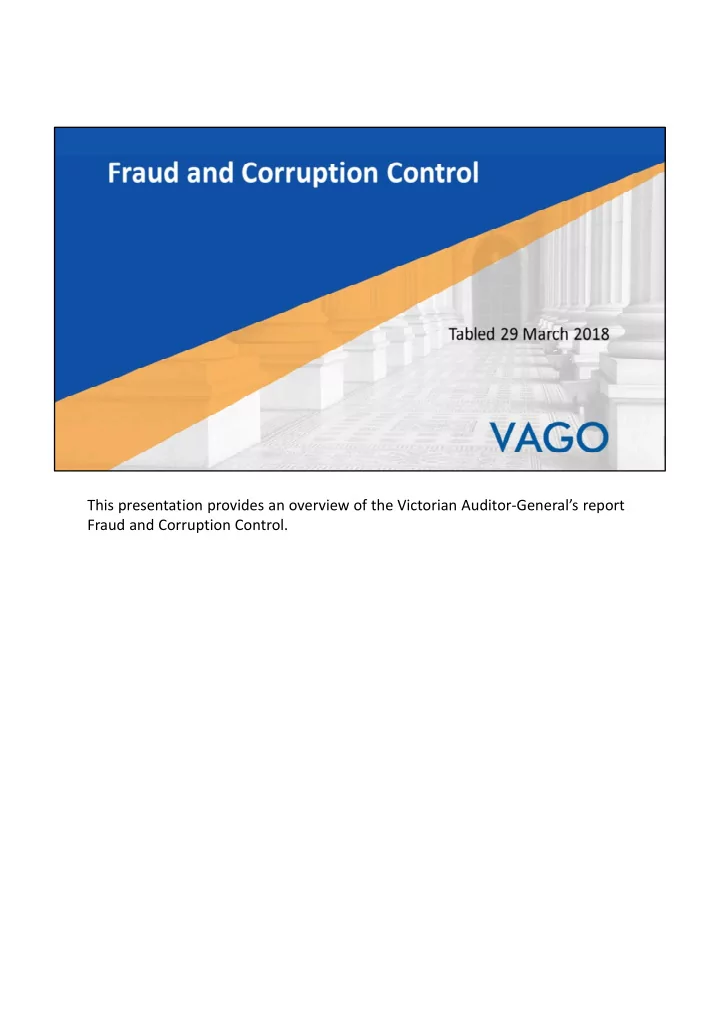

This presentation provides an overview of the Victorian Auditor ‐ General’s report Fraud and Corruption Control.
The community expects, and the law requires, that public sector employees act with integrity and in the public interest. Fraud or corruption wastes valuable resources, undermines trust and damages the public sector’s reputation.
We examined whether agencies had the right fraud and corruption controls and whether they were working. We examined procurement and human resources practices at the Melbourne Metro Rail Authority (MMRA), Public Transport Victoria (PTV) and the now defunct Major Projects Victoria (MPV) as examples of an administrative office, a statutory authority, and a business unit of the Department of Economic Development, Jobs, Transport and Resources (DEDJTR). We also considered whether PTV had addressed issues identified by the Independent Broad ‐ based Anti ‐ corruption Commission’s (IBAC) Operation Fitzroy investigation.
Agency executives are endeavouring to build the right culture, however, this intention is undermined by: delays in implementing key actions to prevent fraud and corruption, and missed opportunities to promote the desired culture through policies, good documentation and training. This has resulted in inconsistent compliance, and reduced assurance that major fraud and corruption cannot occur, or will be detected.
A Fraud, Corruption and Other Losses policy has been mandatory for agencies since 1 July 2017. DEDJTR only recently finalised its policy and control plan. The delay meant DEDJTR was missing an opportunity to set clear and consistent expectations of staff. In the absence of an overarching DEDJTR policy, MPV and MMRA developed their own policies, though MPV’s remained in draft form and was incomplete. PTV’s policy met requirements.
Organisations can promote a culture of integrity through training. We found that training was provided to staff across the areas we audited. However, DEDJTR does not consistently maintain records of attendance at training to demonstrate that staff exposed to higher risks of fraud and corruption have received training.
We found deficiencies in employment screening, including failures to complete and document police checks, reference checks and qualification checks—or respond appropriately when checks highlighted problems.
We identified instances where individuals had declared conflicts of interest, but these conflicts were not actively managed, and action plans were not enforced. Human resources functions were also not consistently requiring staff making hiring decisions to declare any conflicts of interest when undertaking recruitment.
Gifts, benefits and hospitality policies were in place, but they were not always operating as intended. MPV staff had accepted a high proportion of offers from suppliers with the endorsement of management. DEDJTR’s Integrity Services Unit oversaw MPV's processes and did not take action, despite knowing about these practices. DEDJTR has advised that it has since strengthened its processes to address this.
While procurement controls did exist, poor record keeping meant agencies could not always demonstrate compliance. We also found the audited areas were not consistently vetting potential suppliers. There is also limited monitoring of procurement data for indicators of fraud and corruption. DEDJTR is currently trialling a data analytics program at MMRA.
We found missing and inaccurate information in DEDJTR’s fraud and corruption register. There were instances where losses due to fraud and corruption were not reported as required, and suspected corruption was not reported to IBAC. Mandatory reporting to IBAC came into effect in December 2016, after these examples occurred. We also identified examples where decision ‐ making processes about whether to attempt to recover funds lost to fraud were not appropriately documented.
Operation Fitzroy was an investigation into allegations of serious corruption in the former Department of Transport and PTV. PTV has made considerable progress in implementing many of its initiatives to address the investigation’s findings. However, gaps remain in certain areas, particularly for procurements under $25 000.
We made a total of 17 recommendations, all of which have been accepted.
For further information, please see the full report of this audit on our website, www.audit.vic.gov.au.
Recommend
More recommend